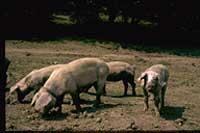Ecological pigs ecological pigs
Phosphorus is essential for the cultivation of animals, but as birds and pigs assimilate very badly the organic phosphorus, additives of inorganic phosphorus are added together with the usual diet. To solve the pollution problems caused by phosphorus removed with residues, researchers at the Canadian University of Guelph propose the cultivation of genetically modified pigs.

These transgenic pigs have the ability to degrade organic phosphorus thanks to an enzyme they contain in saliva. In order for the salivary glands to produce this enzyme, using the bacterium Escherichia coli, researchers have introduced genes that control the enzyme phytase into the swine genome.
To analyze the activity of the phytase of the bacteria in the salivary glands, the phosphorus removed in the faeces of the pigs was measured and it was found to be 11% less than the amount of phosphorus present in the excretion of common pigs. The researchers consider that the result is very good and, in addition to solving the environmental problem it generates, opens the way to investigate with other genes the successes obtained.
However, they are now facing another problem: Will consumers accept the meat of a transgenic animal?
Buletina
Bidali zure helbide elektronikoa eta jaso asteroko buletina zure sarrera-ontzian











